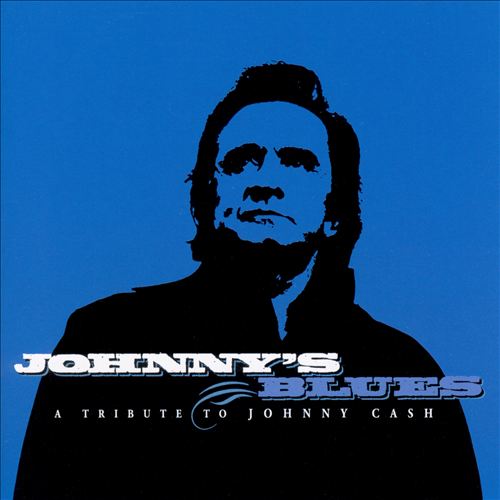Om Suite Ohm (2013)
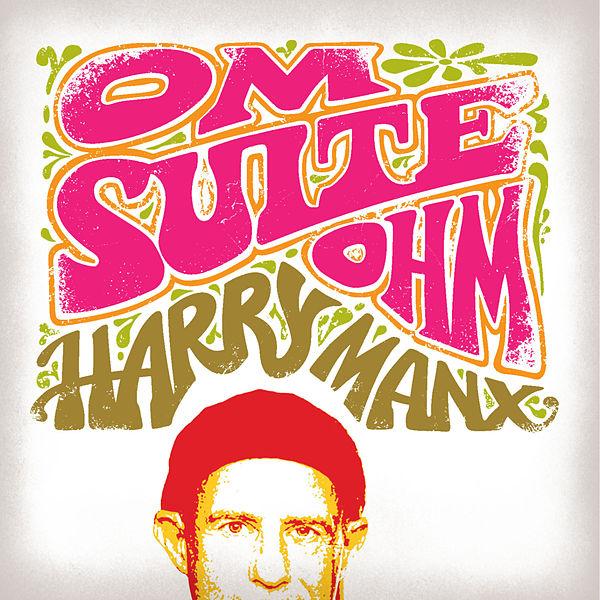
Track Listing:
1. Further Shore 4:29
2. Way Out Back 4:58
3. A Love Supreme 4:50
4. The Blues Dharma 3:21
5. All Fall Down 4:07
6. Saya 3:09
7. The Moon Rose Up 4:22
8. Carry My Tears 2:50
9. Reuben’s Train 4:03
10. Stay Tuned 1:26
Strictly Whatever (2011)
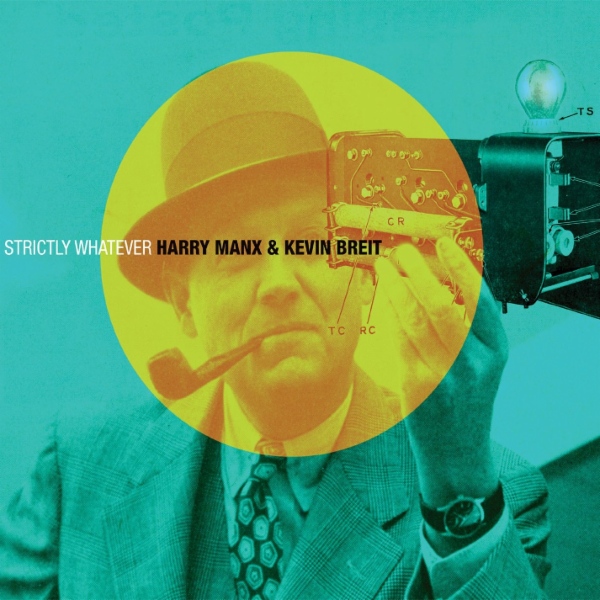
Track Listing:
1. Sunny 3:19
2. Nothing I Can Do 3:11
3. Looking for a Brand New World 4:18
4. Hippy Trippy 3:56
5. Mr Lucky 3:14
6. Note to Self 2:11
7. Do Not Stand At My Grave and Weep 5:29
8. Little Ukelele 2:30
9. There Was a Girl 4:46
10. Looking for a Plan 3:44
11. Dance With Delilah 3:56
12. Carry My Tears Away 2:44
Story
EDMONTON, AB – Stony Plain Records announces a May 24 release date for the new collaboration from guitar masters Harry Manx and Kevin Breit, Strictly Whatever, with U.S. distribution by ADA. The pair’s third album together, Strictly Whatever is the Manx/Breit team’s second CD for Stony Plain and follows the critically-acclaimed In Good We Trust, released in April of 2007.
A new Harry Manx and Kevin Breit CD is always full of eclectic musical delights, and for Strictly Whatever each of the two guitarists brought a number of different original songs to the table, plus unique covers of Bobby Hebb’s classic, “Sunny;” and the John Lee Hooker chestnut, “Mr. Lucky.”
“What’s different for me on this CD is that I played mostly baritone guitar, which adds a good bass-end to the tunes,” says Harry Manx. “I also sat down and played kick drum and snare with my left and right feet while playing the guitar. Kevin brought a wide variety of stringed instruments and electronic pedals.”
“Between us, Harry and I sing on most all of the songs,” explains Kevin Breit. “He and I sing lead on three or four songs each, and there are three vocal duets. Harry plays Mohan Veena, the Indian instrument he brings to all his recordings and live gigs, as well as banjo, baritone electric guitar and lap acoustic guitar; and I played just about everything else.”
Kevin Breit contributes six new songs on Strictly Whatever, while Manx penned three. One of Breit’s new tunes is an all-instrumental track, “Hippy Trippy,” which conjures up visions of the psychedelic ‘60s. “Though we each prepared our songs in advance of the session, we tried to do a lot of the creating in the studio on the spot,” Manx says, adding to the spontaneous vibe of the recordings. “It’s interesting to note that I often play lead lines on guitar on Kevin’s tracks and he plays the leads on mine. That, along with many other details of our recording sessions were never discussed in advance…we just allow each other to do their best…only one rule, Strictly Whatever rules!,” enthuses Manx.
Isle of Manx – the Desert Island Collection (2010)
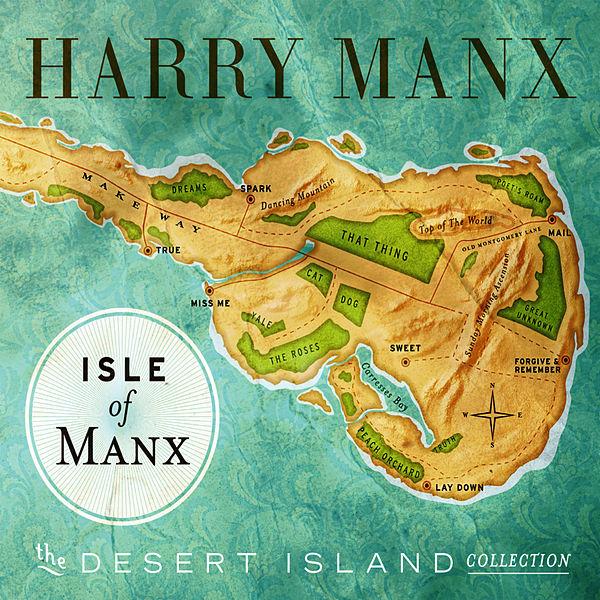
Track Listing:
1. Tijuana 3:59 (Mantras for Madmen, 2005)
2. Coat of Mail 4:26 (Wise and Otherwise, 2002 / 2007)
3. The Great Unknown 4:07 (West Eats Meet, 2004)
4. True to Yourself 4:15 (Bread and Buddha, 2009)
5. Roses Given 3:51 (Wise and Otherwise, 2002 / 2007)
6. A Single Spark 4:21 (Mantras for Madmen, 2005)
7. Your Eyes Have Seen 4:28 (Bread and Buddha, 2009)
8. Don’t Forget to Miss Me 3:25 (Wise and Otherwise, 2002 / 2007)
9. Make Way for the Living 4:26 (West Eats Meet, 2004)
10. Lay Down My Worries 3:18 (Dog My Cat, 2001 / 2006)
11. Your Sweet Name 3:21 (Mantras for Madmen, 2005)
12. Bring That Thing 5:10 (Dog My Cat, 2001 / 2006)
13. Dew on Roses 3:35 (Bread and Buddha, 2009)
14. I’m Sitting on Top of the World 3:25 (West Eats Meet, 2004)
15. Forgive & Remember 3:38 (West Eats Meet, 2004)
Story and Reviews
Mastered by Jordy Sharp and Wynn Gogol
Artwork by Karo Design, Calgary
After releasing nine albums in nine years, it was high time for a “Best Of” CD. Featuring Harry on the 20-stringed Mohan Veena, acoustic slide guitar, lap steel, and banjo, this essential “desert island” collection contains fifteen tunes (thirteen original songs and two cover tunes) that represent the evolution of a highly unique musical style that fuses Eastern sounds, Western blues and acoustic folk.
“Manx has hand-picked the cream of his ‘mystic-ssippi’ catalogue for this celebratory anthology. Melding Eastern voicings and Indian scales with the blues has blown acres of unexplored territory wide open, and the guitarist has evolved an enthrallingly other-worldly vibe as a result. For those unaware of his work, this is a fine introduction to ‘indo-blues’.”
Bread and Bhudda (2009)
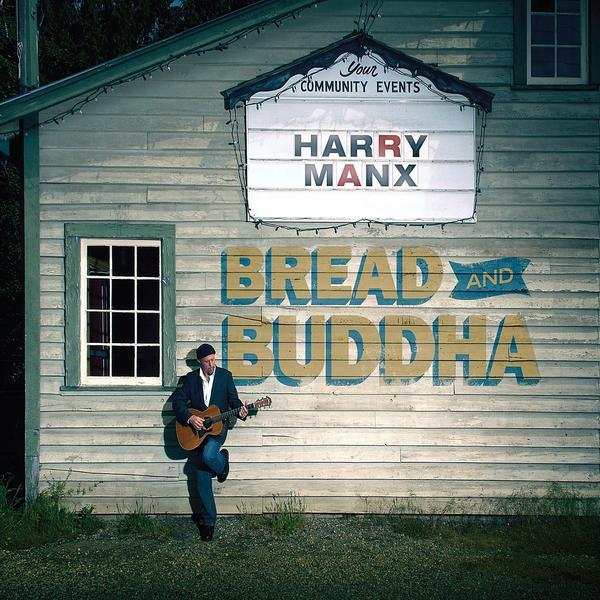
Track Listing:
1. Nine Summers Lost 4:32
2. True to Yourself 4:34
3. Dew on Roses 3:35
4. Walking Ghost Blues 3:28
5. Your Eyes Have Seen 4:29
6. Humble Me 4:08
7. Moon Goin’ Down 4:16
8. Love is the Fire 3:11
9. Long Black Veil 3:55
10. The Unspoken Quest 2:47
Story and Reviews
Harry Manx’s life journey has taken him all over the map, both musically and literally. His ninth album, “Bread and Buddha”, is a musical meditation on the ephemeral nature of the human experience and is a culmination of thirty-five years of world exploration. Harry covers all four compass points of the world music map on this outing, from the rolling guitar groove on “Love is the Fire” and “Walking Ghost Blues”; he revisits traditional blues territory for the covers “Moon Goin’ Down” and “Long Black Veil” and blends in his trademark sensual raga flavours with “True to Yourself” and the instrumental “The Unspoken Quest”. Harry’s evolution as a songwriter shines trough in the wistful, heartfelt folk ballads, “Dew on Roses”, “Your Eyes Have Seen” and “Nine Summers Lost”.
Two years in the making, he has pulled out all the stops with the instrumentation on this outing, including ample use of piano, organ, and scored strings along with drums and bass. This gives the songs a lushness and maturity, much like a well-seasoned wine.
Juno nomination for “Blues Album of the Year”
Produced by Harry Manx
Engineered by John “Beetle” Bailey
Album Design by Michael Dangelmeier, Karo Design
Funding support by FACTOR
“Canadian guitarist and singer-songwriter Harry Manx is an artist that critics have occasionally had a hard time getting their minds around. His unique amalgam of blues and other American roots music, classical Indian forms, and bits of rock, pop, and folk makes him difficult to pigeonhole, and self-appointed gatekeepers of those traditions sometimes bemoan his lack of purity, stubbornly missing the point. But Manx’s trip is really quite easy to grasp: He’s an accomplished and adventurous lap-slide guitarist – whether playing a National resonator, a solidbody lap-steel, a modified banjo or cigar-box guitar, or his signature 20-string Mohan Veena – and a compelling singer with a rich, warm, and soulful voice who writes intelligent and compassionate songs and puts them over with heartfelt conviction.
Manx is also a commanding live performer – as documented on his previous CD, Harry Manx & Friends Live at the Glenn Gould Studio – who routinely floors even new audiences (which is why Richie Havens has him open as many of his shows as possible).
Manx’s past work has ranged from relatively straight ahead folk-blues blended with Indian modalities and ornamentation to more experimental explorations of his personal East-West fusion – with lots of inventive covers of bluesmen from Muddy to Jimi along the way. The songs on Bread and Buddha build on that foundation, but the lyrics reflect greater maturity and the musical arrangements are more tightly focused and skilfully produced. Manx’s instrumental prowess remains evident throughout – but everything works to showcase the vocals and reinforce the songs. For example, the album opens with a ghostly slide line played on the National which is quickly overlaid with a more prominent National track that establishes a rootsy groove, and with the first words of “Nine Summers Lost” attention shifts to Manx’s voice – but the ghostly slide track persists throughout, adding subtle colors that are nearly subliminal at some points, but that you would miss immediately if they suddenly weren’t there.
The second song, “True to Yourself,” beautifully weds Manx’s slinky slide guitar and exotic Mohan Veena lines with a potent brew of bass, drums, organ, and piano, lightly infused with tabla beats and Samidha Joglekar’s sparkling Indian vocal accompaniment. That’s followed by “Dew on Roses,” a majestic ballad centered on the interplay of acoustic slide, National, and grand piano, with poetic lyrics that gracefully address difficult topics such as heartache and the impermanence of life.
Other gems include another thoughtful and introspective ballad (“Your Eyes Have Seen”), an earthy boogie-blues (“Walking Ghost Blues”), a Springsteen-esque rocker (“Love Is the Fire”), and an atmospheric Indian duet on which Manx plays Mohan Veena and tamboura and Joglekar contributes wordless vocals (“The Unspoken Quest”). My least favorite song is the string-driven “Humble Me,” a love ballad written by Manx’s long-time collaborator Kevin Breit and made popular by Norah Jones – a song that nonetheless has enough commercial appeal to make Manx a mega-star were it to find its way onto mainstream radio. Covers of Charley Patton’s “Moon Goin’ Down” and the country ballad “Long Black Veil” – originally made famous in 1959 by the great Lefty Frizzell – round out this superb recording. “
“This the most authentic melding of Blues, Folk and Asian music that I think I have ever heard and Harry Manx has created a gentle and thought provoking sound that cannot but point straight to the soul of man – if it isn’t genius then it isn’t far short. He plays predominantly in a Blues genre and this is the strength of the music – the other elements are slotted in as core components of the music and not for effect but they don’t dominate, they just allow his essential strengths to shine.
Manx’ s lap slide guitar is pure Blues but he works in some stunning picked National Steel guitar and with his throaty voice he really works in a fine Blues medium. On ‘Walking Ghost Blues’ for instance he sounds as though he was walking the hills of North Mississippi while the opener ‘Nine Summers Lost’ has an eerie space around the guitar and Clayton Dooley’s wailing (quietly) organ adding to the mood and atmosphere.
‘True To Yourself’ is an outstanding number with Manx playing the Mohan Veena – a sitar-esque 20 string guitar-bodied marvel – and Ravi Naimpally delivering classical Hindustani vocal alongside Tabla; the whole thing simply sent shivers down my spine.
The songs all tell a story or illuminate a mood and track after track simply reiterate this man’s quality of writing, playing or simply performing.
I am actually annoyed that I haven’t discovered Harry Manx sooner but I will be rectifying the situation in a hurry – something you can’t accuse Harry Manx of.”
“ … Manx is blessed with a breathy voice that is both evocative and soothing, perfectly suited to the laid back feel that pervades this album. Opener Nine Summers Lost is deep in Ry Cooder territory, no bad thing, but still retains a vibe that makes it unmistakably Manx. We get our first taste of the Mohan Veena on True To Yourself. The Eastern influences prevalent in the ethereal backing vocals of Samidha Joglekar and that beautiful mystical sound produced by the Mohan Veena.
This is a vibe album. A weekend treat to relax to, the perfect antidote to the working week. There are no duds on here at all. Your Eyes Have Seen is a particularly brilliant track. The excellent and delicate slide guitar plays nicely alongside the bittersweet, downbeat even, lyrics.
Even if you’re not a blues fan, the songs on here are strong enough to enthrall. It reminds me a lot of the great slide players like Kelly Joe Phelps and Johnny Dickinson, but there is also a feel of ‘Local Hero’ era Mark Knopfler. This is a great album, confident and endearing from a musician that really should be better known than he is.”
“The ever-restless Manx, a world traveler now based on British Columbia’s Salt Spring Island (an artistic haven of sorts), blends blues and folk with exotic strains of Indian classical music to stunning effect.
Manx is a deeply spiritual artist, and material reflects his quest for deeper meaning. His lyrics can be a bit cryptic at times, but he’s dealing with big stuff – life, love, and our place in the world. Covers include a stunning reading of “Long Black Veil” (a tune previously recorded by Manx for “Johnny’s Blues,” a compilation celebrating the late Johnny Cash), and the hushed reverence of Kevin Breit’s “Humble Me,” best known for Norah Jones’ version.
Manx seems to be moving away from the blues a bit with this outing. Charlie Patton’s “Moon Going Down” is given a gently simmering reading powered by subtle but soulful organ. But harmonica is absent altogether, and despite its title, the almost-apocalyptic “Walking Ghost Blues” isn’t a typical twelve-bar. Eastern influences (Manx studied for several years in India with the inventor of the Mohan Veena) are most prominent in the haunting “True To Yourself” and “The Unspoken Quest,” both featuring classical Indian vocals from Samidha Joglekar, and Manx’s own compositions lean to minor-key folky foundations. Somewhat out of place among the primarily gentle and contemplative fare is the rocky “Love Is the Fire,” one of only two tracks to feature Simon Godin’s electric guitar.With each recording, Manx seems to be marking a point in an ongoing quest for deeper meaning. Bread And Buddha (the man loves his puns, as other titles in his discography attest) is a fascinating, often lovely, and genuinely moving glimpse into a soul more concerned with spiritual health than with amassing wealth. Recommended!”
Live at The Glenn Gould Studio (2008)
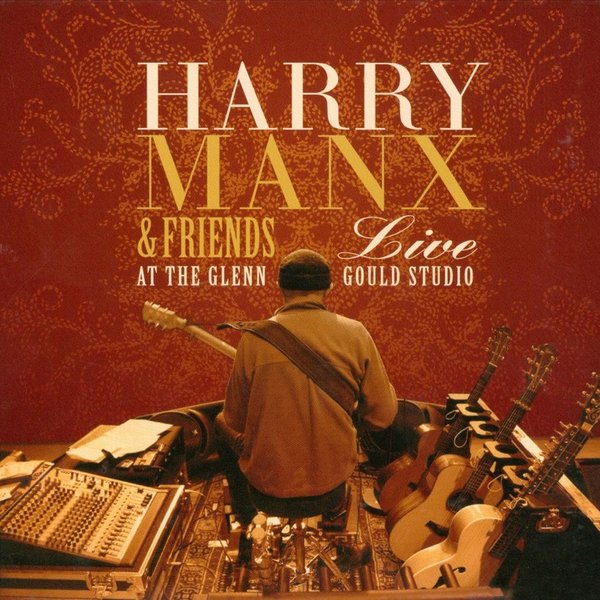
Track Listing:
1. Point of Purchase 7:46
2. Take This Hammer 4:34
3. Single Spark 7:13
4. Voodoo Child 8:54
5. Good Time Charlie 4:50
6. Can’t Be Satisfied 10:09
7. Samidha’s Tune 6:59
8. Tijuana 8:44
Story and Reviews
Harry Manx built a career putting a unique spin on the blues, serving up his distinctive and hypnotic brew of Eastern and Western sounds to audiences worldwide. Combining the sensuality of traditional blues with transcendent Eastern sounds has become his trademark.
It’s in a live setting that this bridge between “heavenly” India and “earthy” American blues is most effectively built. As Harry says, “My goal has always been to draw the audience as deep as possible into the music.”
In March of 2007, CBC Producer Todd Fraracci put together a bewitching blend of musicians for a special concert event entitled “Heaven and Earth – Harry Manx and Friends” at the Glenn Gould Studio in Toronto to further explore this delicate balance. The accompanying musicians perfectly complement his style, highlighting his Indian influences and allowing the music to successfully venture all over the world map. Previously recorded material is presented with added dimensions, producing new revelations that occur with each listen.
Never before has this configuration of musicians been captured live; “Live at the Glenn Gould” represents the best of their one-of-a-kind collaboration. This is Harry as he is best digested, serving the musical palate of his devoted audience.
Harry Manx: Vocals, 6-string guitar, lap slide guitar, banjo, Mohan Veena
Kevin Breit: Guitars, mandolin
Steve Marriner: Harmonica
Samidha Joglekar: Vocals
Ravi Naimpally: Tablas
George Koller: Bass, dilruba
“Harry Manx has been gently courting his audience with his Indian-inspired take on the blues, a marriage of Eastern music to Western, creating a niche that has more to do with world music than anything else more limiting. His success has been built on the back of his instrumental prowess on his weapon of choice: the 20-string Mohan Veena, which subtly blends Eastern sounds to blues-friendly turf. On his eighth release, Harry ups the ante with the addition of two members of Toronto-based world music ensemble Tasa. You can almost hear the audience buying some time, clapping politely between songs as they acclimatize themselves to this new balance. It doesn’t take long to win them over, as the hyper-simpatico league of support players (notably guitarist Kevin Breit and harmonica-player Steve Mariner) weave in and around Harry’s leads with deft skill. If Samidha Joglekar’s vocals contrast too starkly with Harry’s croon on “Point of Purchase,” all is forgiven by “Single Spark,” and Joglekar’s contribution at the tail end of the jam-friendly “Voodoo Chile” earns its just rewards. Of special note is Marriner’s wailing harp solo on the ten-minute jam that was Muddy Waters’ “Can’t Be Satisfied,” which will more than satisfy. Live pays significant dividends across its 60-minute length. The faithful are well served while the casual Manx fan will benefit from a closer look into the very core of Harry’s muse.”
“For people who are fans of Harry Manx and have never had the opportunity to hear him in concert, Live At The Glenn Gould Studio is a disc you don’t want to miss because not only is the sound quality amazing, it also captures the immediacy and intimacy of the live concert experience. For those who aren’t familiar with his unique style of music, this a wonderful way of being introduced to what he does. You will hear how west and east can meet, with beautiful and harmonious results. No matter how you look at it, Live at the Glenn Gould Studio is great music.”
In Good We Trust (with Kevin Breit, 2007)
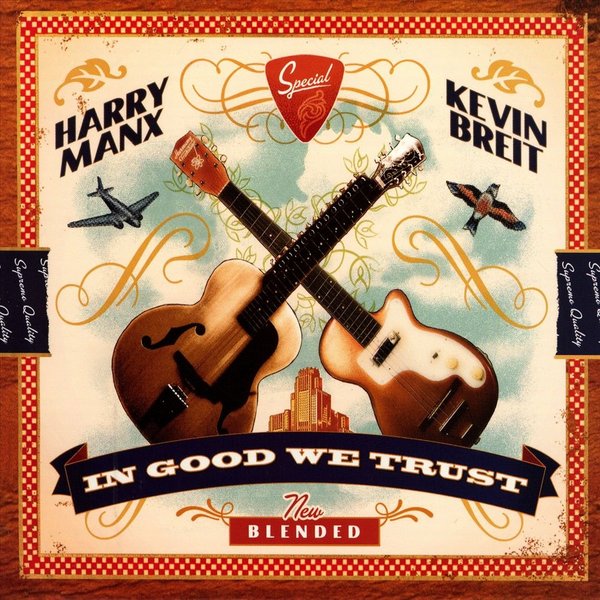
Album Design by Michael Dangelmeier, Karo Design
Track Listing:
1. I’m on Fire 3:43
2. Sometimes 4:55
3. Bottom of the Hill 3:38
4. Better Man’s Waltz [Instrumental] 3:01
5. Death Have Mercy 4:44
6. Steal 6 5:15
7. Ship of Fools 4:28
8. In Good We Trust [Instrumental] 2:47
9. Hang On 5:01
10. Don’t Swim, Float [Instrumental] 2:49
11. Sisters [Instrumental] 4:14
Story and Reviews
“The follow-up to this pair’s Jubilee album (Northern Blues, 2003) finds them basically starting where they left off. And fans should be thankful for that. The instrumentation is top-notch and the selections seem to suit the record perfectly. A great example of this is the haunting but folksy reworking of Bruce Springsteen’s “I’m on Fire,” which is still dark but has a certain hint of brightness thanks to the use of bazouki and tamboura.
However, the original material definitely measures up to the covers, especially the smooth and tender “Sometimes,” which glides along effortlessly. Meanwhile, Manx and Breit weave more magic with the strolling, ambling “Bottom of the Hill,” which is quite catchy …This is definitely truer during the rootsy and looser “Steal,” as Manx and Breit mix roots, folk, and blues impressively. The album is offset by pretty instrumentals, the first being “Better Man Blues,” which has an airy yet dark quality running through it, resembling a piece of a soundtrack score that Mark Knopfler hasn’t gotten around to yet. However, a rather heady, psychedelic-era tune called “Death Have Mercy” brings to mind Jeff Beck’s work circa Frankie’s House.
Meanwhile, the title track is the Delta blues personified, even if there are flourishes of guitar strumming over the standard slow-creeping blues chords. For the homestretch, Manx and Breit create the gorgeous and cozy “Hang On,” which sounds like it was recorded in one take as the sun was coming up. The album, as it states on its cover, is indeed supreme quality.”
~ Jason MacNeil, All Music Guide, May 2007
Released on Stony Plain Records
Harry Manx: Vocals, acoustic guitar, slide guitar, lap steel guitar, banjo, drums
Kevin Breit: Acoustic guitar, electric guitar, slide guitar, National guitar, tenor guitar, mandocello, mandola, mandolin, tamboura & background vocals
Engineered by John “Beetle” Bailey
“… From the Canadian guitar duo of Vancouver’s Harry Manx and Toronto’s Kevin Breit come their second CD of blended acoustic instrumentals and traditional songs with Harry’s relaxed vocal and virtuosity with Mid-eastern and South Asian stringed instrument styles predominating … Breit’s smooth guitar playing blends nicely with Harry’s meandering slide work on his many stringed instruments that take you deep into an exotic trance of a dark bazaar or mid eastern Souk. Both Breit and Manx experiment on banjo, mandocello, tamboura, mohan veena and traditional lap steel as well as other sound devices to put the dream like vision into the making of this CD. A passionate take on world folklore that is a must for someone looking for something a little unorthodox.”
“… Their first collaboration, Jubilee, was nominated for two Juno Awards and walked away empty handed. In Good We Trust has Juno written all over it … Manx’s warm yet gravelly voice never gets tiring and the songwriting of both musicians is well beyond par. In Good We Trust features the best of the two musician’s abilities on guitar throughout but nowhere is their skill more evident than on “Don’t Swim, Float,” where their dueling instrumental banter is as lively a deliverance as any.”
“In Good We Trust incorporates elements of blues, country, bluegrass, jazz, electronic, and Indian music into a soulful stew that manages to be simultaneously laid-back and intense.”
”There’s no other way to describe this union of Canada’s 2 most strikingly unorthodox string wielders than by calling it a match made in Guitar Heaven … The great news is that “In Good We Trust” fulfills one’s anticipations from the opening bell … Blues, Indian, Folk, and especially Jazz elements are interwoven into a roots kaleidoscope by these gentle masters …
Death Have Mercy” is another boundary-stretching hybrid that’s as compelling as honey to a bee. Many other selections will make you feel you’re floating off into the blue horizon, like “Ship of Fools”, the bluegrass-y “Swim Don’t Float, and the dreamy finale “Sisters” that features some awesome electric slide guitar from Kevin. So kick back, find your favorite relaxing place, and treat yourself to one of the most sublime listens this side of the Himalayas.”
Mantras for Madmen (2005)
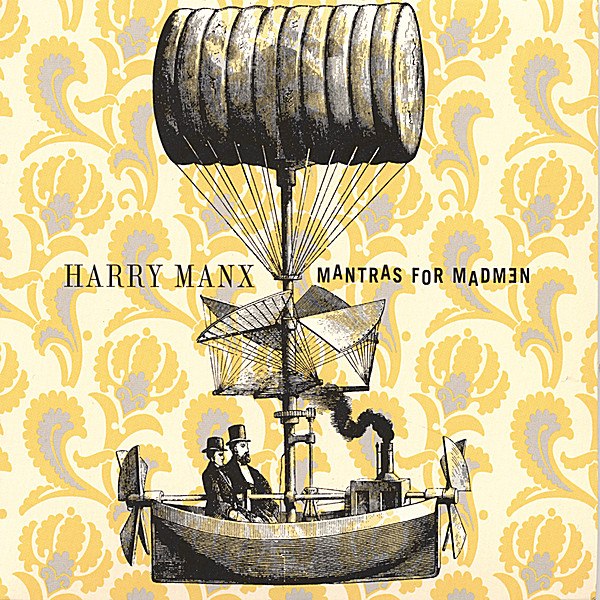
Track Listing:
1. Where Fools Die 3:54
2. San Diego-Tijuana 3:56
3. The Point of Purchase 4:12
4. Never the Twain 3:42
5. A Single Spark 4:21
6. Your Sweet Name 3:18
7. Afghani Raga (instrumental) 3:45
8. It Makes No Difference 3:58
9. Don’t Take His Name Away 5:07
10. It Takes a Tear 3:41
11. Nothing Fails Like Success 3:21
12. Talkin’ Turban (instrumental) 2:30
Story and Reviews
Harry Manx built a career putting a unique spin on the blues, serving up his distinctive and hypnotic brew of Eastern and Western sounds to audiences worldwide. Combining the sensuality of traditional blues with transcendent Eastern sounds has become his trademark.
It’s in a live setting that this bridge between “heavenly” India and “earthy” American blues is most effectively built. As Harry says, “My goal has always been to draw the audience as deep as possible into the music.”
In March of 2007, CBC Producer Todd Fraracci put together a bewitching blend of musicians for a special concert event entitled “Heaven and Earth – Harry Manx and Friends” at the Glenn Gould Studio in Toronto to further explore this delicate balance. The accompanying musicians perfectly complement his style, highlighting his Indian influences and allowing the music to successfully venture all over the world map. Previously recorded material is presented with added dimensions, producing new revelations that occur with each listen.
Never before has this configuration of musicians been captured live; “Live at the Glenn Gould” represents the best of their one-of-a-kind collaboration. This is Harry as he is best digested, serving the musical palate of his devoted audience.
Produced by Jordy Sharp
Engineered by Wynn Gogol
Harry: Vocals, 6-string guitar, lap slide guitars, Mohan Veena and tamboura
Emily Braden: Vocals
Niel Golden: Tablas / percussion
Steve Marriner: Harmonica
John Reischman: Mandolin
Billy Mendoza: Bass
Top 10 Blues CDs of 2005 – Chicago Sun Times
Juno Nominated 2005
“While most musicians are content to work within the accepted boundaries of their chosen style, lap-slide guitarist Harry Manx likes to color way outside the lines. His crayons? Soulful, raspy vocals, poetic lyrics, and the whining drones and mysterious melisma of Indian music. In addition to picking Hawaiian-style flat-top à la David Lindley, Ben Harper, or Kelly Joe Phelps, Manx plays the Mohan Veena – a 20-string archtop developed by Indian slide wizard Vishwa Mohan Bhatt. East/West fusions can sometimes sound forced or awkward, but Manx – who studied with Bhatt for five years – dodges that bullet. On Mantras for Madmen, mandolin, banjo, harmonica, tamboura, tabla, and haunting female voices swirl seamlessly around intricate slide melodies, creating an exotic, yet strangely timeless sound. Drawing from blues, ragas, and the story-telling heritage of British Isles folk music, Manx conjures songs that are as bewitching as they are unique. “
“Manx’ newest release, Mantras for Madmen, finds perfect symmetry between his Alt-Folk, Indian ragas, and Blues theology. But the tonal complexion of the CD is richer than its subtlety might suggest. Dissect, for instance “Your Sweet Name.” It’s built on a rhythm base of tablas, with sitar-like flourishes. It rocks gently on an insistent groove common to Alt-Folk. And when the guitar solo comes, it’s phrased in riffs wrought from picking techniques that could have come from Bill Monroe’s songbook. Is it Blues? Yes, but of a different stripe.”
“This is one of those smaller production discs that you may have to search around for, but the hunt becomes worth the effort when you put it in the player … It’s a very interesting and eclectic blend that is rooted in the blues, yet he has incorporated the rhythms of India and some of the instruments, the tamboura and in particular the Mohan Veena. The latter is played like a lap steel but has seven strings plus resonator strings. He wrote all but two of the songs here, and for those he didn’t write he picked good songwriters; J.J. Cale and Robbie Robertson. This disc has a strong bluesy undertone and a light feel, at times played on the Indian instruments where it can give a whole other feel. Take the J.J. Cale tune, San Diego-Tijuana: it has the same flow as the original but played with the lead instrument being tamboura and Mohan veena, which adds a whole other dimension. The lyrics show that the time spent in India has had its effect upon his thinking also – again it is adding depth to the songs. A very interesting disc that seems to unfold and reveal new layers with each playing, a lot like taking an onion apart layer by layer.”
“When you put this CD into the slot for the first time you become aware that the whole set up is summed up in one word – QUALITY. Harry Manx spent twelve years of his life living in India and when you listen to his music it shows. Harry said “The way I see it, Blues is like the earth and Indian music is the heavens. What I do is to find a balance between the two. This CD has a range of styles on it from ballad to fantastic tracks like ‘Your Sweet Name’ which has a driving pace with some stunning guitar work. Harry plays a Moveena [sic] (That’s how it sounds) which is an 18 string guitar like instrument that makes noises that leaves you craving for more. Musical drug addiction. “Afghani Raga” forced me to lay back in my reclining seat, close my eyes and picture the east with all of its smells, sounds and colours. “
West Eats Meet (2004)
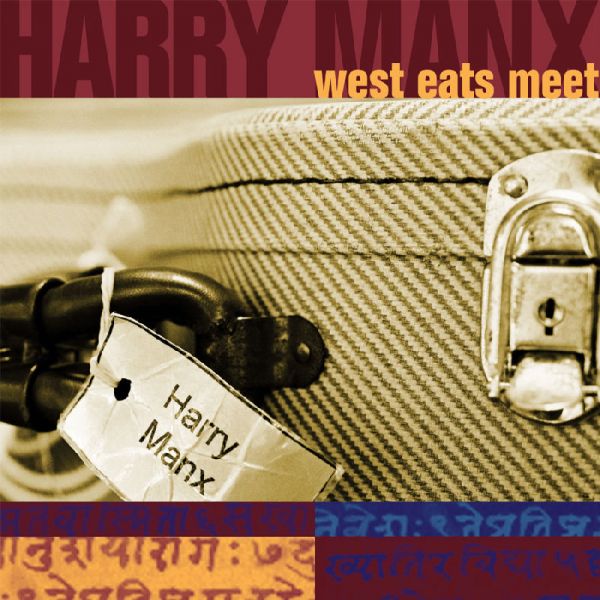
Track Listing:
1. Help Me 3:09
2. Make Way for the Living 4:25
3. Shadow of the Whip 3:35
4. The Great Unknown 4:05
5. Forgive & Remember 3:36
6. Sittin’ on Top of the World 3:27
7. That Knowing Look of Fate 3:36
8. Stir a Little Breeze 3:28
9. Tough & Tender 4:01
10. The Ways of Love 4:32
11. Something of your Grace 3:33
12. Hector’s Song 2:16
Story and Reviews
2005 Canadian Folk Music Award winner for Best Solo Artist & Producer of the Year
2005 Juno Award nomination
Top CDs of 2004 – Acoustic Guitar Magazine
“… Listening to this record is sure to stir the romanticist and dreamer in everyone who has the pleasure of hearing it, as Manx’s exceptional song writing is bested only by his rich smooth baritone vocals and his use of diverse instruments such as the mohan veena (20 stringed sitar) and tamboura alongside lap steel, banjo and harmonica. The accompaniment is sparse throughout this album, with only occasional tabla drums and keyboards added to the above mentioned instrumentation. In places you will hear some absolutely lovely background vocals, as well as harmonies, provided by newcomer Emily Braden and Australian trio The Heavenly Lights. Listen closely for Ms. Braden though, as her voice is remarkable.
To choose highlights is a difficult task, as every track on this tasty record deserves a mention. You surely can’t go wrong with the opening cover of Sonny Boy Williamson’s “Help Me,” which features some slick harp and picking by Manx, giving it a down home yet big city feel all at once. Harry’s vocals capture center stage on ”Make Way For The Living,” a soft spoken number whose beautiful background harmonies led by the sweet warbling of Emily Braden lighten and brighten a number that could easily be mistaken for having dark and dismal overtones. The following tune,”The Great Unknown,” is equally lush in harmony and lyrical content while pondering the unforeseen future.
Manx gives the Mohan veena a proper workout on the instrumental “Forgive and Remember,” accompanied only by Niel Golden on tabla drums. Golden’s work will blow your doors off on the following cover of ”Sittin’ On Top Of The World.” This familiar standard has new life breathed into it as never before; it’s presented as an Indian/bluegrass banjo raga complete with silky three part harmony by The Heavenly Lights … If you thought Harry was a good songwriter before, wait until you wrap your ears around this one.
What makes Harry Manx’s music so appealing is his ability to tell you an entire story in the space of about four minutes … West Eats Meet is about as close to flawless as an album as they come. It’s one of those rare jewels that surprises you upon the first listen and grows on you with every subsequent spin. On a scale of 1-10, this one is a 20.”
– Steve Hinrichsen, Blues Bytes
Produced by Jordy Sharp
Engineered by Wynn Gogol
Harry Manx: Vocals, lap slide guitars, Mohan Veena, 6-string banjo, harmonica & tamboura
Additional vocals by Emily Braden, Sara Marreiros, Christine Best & the Heavenly Lights
Niel Golden on tablas / percussion
Wynn Gogol on keyboards
“With each album Manx releases, his deep Indo-Canadian roots music becomes more defined and further accomplished. The title West Eats Meet is a play on Ravi Shankar’s “West Eats Meat,” a nod both to an Indian musical giant and Manx’s own western usage of Indian instruments, folk melodies and styles. Manx strays a bit from his standard blues idiom with this album and introduces gospel flavours with the help of backing singers Emily Braden and Australian trio the Heavenly Lights. The latter add depth and a churchy soul to “The Great Unknown” and, along with Manx’s banjo, “Sitting on Top of the World” becomes a down from the mountain call to worship out of an as yet undiscovered Baptist/Hindu hymnal.
One of two covers on the album, Sonny Boy Williamson’s “Help Me” features an under pad of delicate drones and a slinky slide solo injecting a little Rajasthan into this Chicago standard. Manx’s instrumentals are always ingenious takes on sitar-like phrasing, note bending and melodies and the two offered here — “Forgive and Remember” and “Hector’s Song” don’t disappoint.
Where early records like Dog My Cat and Wise and Otherwise often separated the blues material from the Indian-influenced material, West Eats Meet makes an effort to merge them on nearly every song. Tabla and Dholak add basic but fundamental percussion, complimenting Manx’s steady backbeat accent on his guitar strings, and not only does he play his Mohan Veena and tamboura on many tracks, he even sings in a raga style on “The Ways of Love.” This is the album’s greatest strength as it highlights what really makes Manx a unique artist. Very few people are making this sort of world folk blues fusion and if Harry Manx continues steeping this melting pot, the world will have to take notice of this innovator soon.”
Road Ragas (2004)
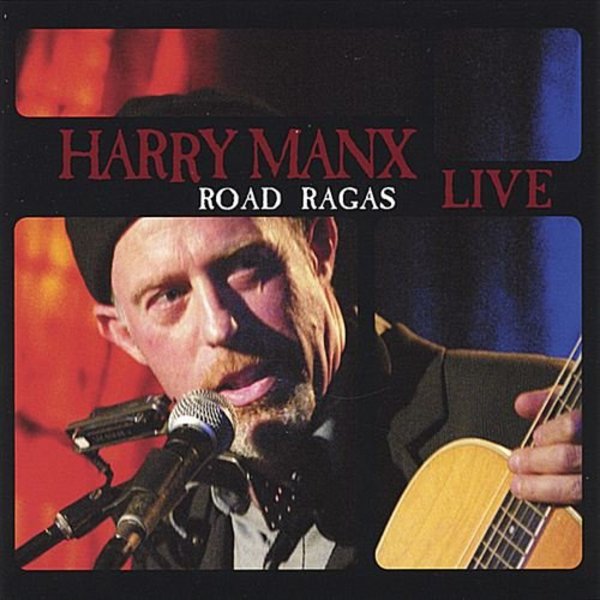
Track Listing:
1. Intro 1:20
2. Bring That Thing 5:34
3. Call it the Blues 3:38
4. Baby Please Don’t Go 3:46
3. Reuben’s Train 4:45
4. Only Then Will Your House Be Blessed 3:32
5. Don’t Forget To Miss Me 4:36
6. Take This Hammer 5:11
7. Coat of Mail 4:56
10. Nat Bhariav 1:58
11. The Gist of Madhuvaniti / The Thrill is Gone 5:56
12. Spoonful 3:59
13. Sunday Morning Ascension 3:32
14. Sitting on Top of the World 3:26
15. Can’t Be Satisfied 3:56
16. Lay Down My Worries 3:40
Story
An inspiring journey from around the world, this collection condenses more than 100 hours of music recorded at shows in Canada, Europe and Australia. Includes tunes from his early albums (Dog My Cat, Wise and Otherwise, Jubilee, West Eats Meet), as well as unreleased material, this “concert program” satisfies the best of both Manx’s rich recording history and the foot-stomping memory of the live show. In his uniquely signature style, Manx combines songs that are steeped in traditional blues (Spoonful, Sitting on Top of the World) with beyond-categorization originals that move between a blues foundation and Indian raga-induced world fusion flavour. The result is an album that delivers solidly to both blues fans and discerning folk/roots listeners.
Recorded Live at the Basement, Sydney, Australia in 2003
Harry Manx: Vocals, 6-string lap guitar, Mohan Veena, 6-string banjo & harmonica
Produced by Jordy Sharp
Wise and Otherwise (2002, re-released 2007)
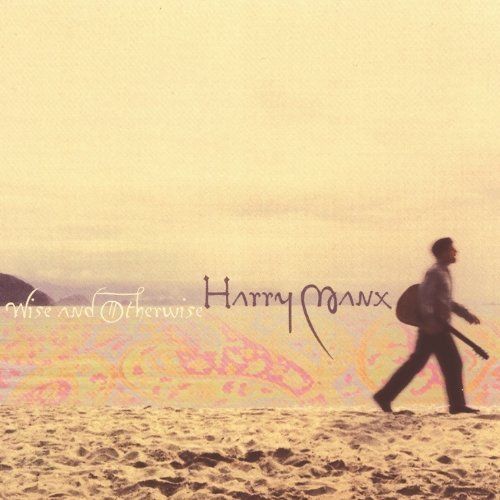
Track Listing:
1. Only Then Will Your House be Blessed 3:03
2. Death Have Mercy 3:00
3. Roses Given 3:49
4. The Gist of Madhuvanti / The Thrill is Gone 1:14/5:00 (total 6:14)
5. Coat of Mail 4:23
6. Don’t Forget to Miss Me 3:22
7. A Little Cruel 4:13
8. Crazy Love 3:53
9. Foxy Lady 2:55
10. Makes You Wanna Die Laughing 4:20
11. Tethered Dogs 3:53
12. Raga Nat Bhariav 3:09
Story and Reviews
Juno Award Nomination for Best Blues Album
Penguin Eggs Magazine/Edmonton Folk Festival Award for Album of the Year
2002 South Australia Blues Society Award for Album of the Year
Originally released in 2002 on the Northern Blues label, Wise & Otherwise is not only one of Harry’s best albums; it’s one of the best blues discs in recent years. Fans of the Mohan Veena will be charmed with this offering. The exotic instrument is the centre of the traditional song “Death Have Mercy”, as well as the perennial favourite ballad “Coat Of Mail”. Wise & Otherwise also features Harry’s unique version of The Thrill is Gone” where Manx successfully combines the classic blues track with a traditional Indian raga.
Harry Manx on vocals, six string lap slide guitar, mohan veena, banjo and harmonica
Produced by Jordy Sharp
“Wise and Otherwise” is one man and his music and successfully merges two different music cultures into this wonderful sounding bluesy Indian hybrid music. This is acoustic music at its very best.”
“Rarely has folk-blues sounded as hauntingly beautiful”
“He’s his own walking musical blaze. Don’t pass this one up. You’ll wake up in the middle of the night and hear it playing in y our head and slip out of bed to play it right through. Maybe more than once. It’s that good. I’m adding it to the pile of CDs I would grab, after the dog and before the cats, if my house caught on fire. Get it and prepare for the quietest, low-key ass-kicking you’ve ever had.”
Dog My Cat (2001, re-released 2006)
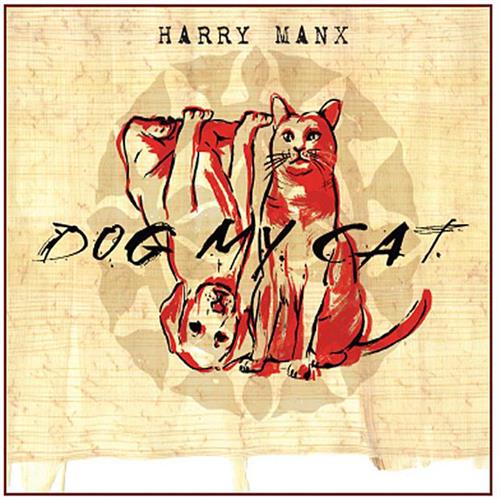
Track Listing:
1. Can’t Be Satisfied 3:18
2. Bring That Thing 5:12
3. Good Morning Stranger 3:04
4. Reuben’s Train 4:07
5. Lay Down My Worries 3:15
6. Rag Bihag – (Dusk Rag) 1:53
7. Sunday Morning Ascension 3:57
8. Baby Please Don’t Go 2:43
9. Brick and Stone 3:02
10. Song for William 1:57
11. Love Ain’t No Game 4:15
12. Shame Shame Shame 3:12
13. Rag Jog – (Evening Rag) 1:12
Story and Reviews
Canadian Independent Music Award for Best Blues Album of the Year
The album that launched one-man-band Harry Manx onto the international stage with its release in 2001 on Northern Blues was re-released in the fall of 2006 on his own independent label, Dog My Cat Records. Sparse, soulful, and contemplative, Dog My Cat highlights Harry’s brilliant mastery of the lap slide guitar, banjo, harmonica and vocals, not to mention the unique Mohan Veena – a 20- string Indian slide guitar.
Recorded in a single 11-hour studio session with only harmonica and occasional guitar solo overdubs, Dog My Cat captured the attention of music peers, fans and reviewers. Of the thirteen tunes on this album, most of them are Manx originals, including the favourites “Bring That Thing”, “Sunday Morning Ascension” and “Lay Down My Worries”. Two instrumental ragas emphasize Manx’s connection to India and that of his years of tutelage under Mohan Veena creator V.M. Bhatt.
Well-chosen cover tunes such as Muddy Waters’ “Can’t Be Satisfied” and “Baby Please Don’t Go” are given a new treatment that had one reviewer remarking “Finally, the promise of Ganges Delta blues is fulfilled.” (SonicNet) Merging traditional blues with that of Indian ragas, it’s this disc that established Harry Manx as the “essential link” between the music of the East and the West. As Harry himself says, “This CD is about the depth and truth of the blues, the transcendence of the raga. Some of the songs hint at the unspeakable, the rest are deep-rooted in the earth.”
Produced by Jordy Sharp
Harry Manx: Vocals, six string lap slide guitar, mohan veena, banjo and harmonica
“This is his first solo album, and as one might expect, it’s a fascinating hodgepodge of differing musical traditions. Happily, Dog My Cat has none of the hippie-dippy multicultural piety that afflicts so many East-meets-West musical experiments – Manx’s approach to the blues is gritty and straightforward, his original songs are tight and tuneful, and when he pauses to play a raga (as he does twice on this album), he manages to imbue the Indian musical form with a soulful depth that somehow has nothing and everything to do with the blues. Highlights are hard to identify on this album because its quality is so consistently high, but his rendition of the Muddy Waters standard “Can’t Be Satisfied” is especially fine, as are his own “Love Ain’t No Game” and the traditional “Reuben’s Train.”
[/testimonial
“Each song possesses more feeling and emotion than a million pop songs could ever deliver.”Music Dish
“Dog My Cat is a very impressive collection of original blues songs … recommended.”
Compilations and Guest Appearances
1997 – Deva Premal & Miten, “Strength of a Rose”, Nurnburg, Germany
1998 – Ma Bharti, “Karizawa Sessions”, Tokyo, Japan
1998 – Hari Prasad Charausia, “Hari Nova”, Bombay, India
1999 – Avaroha, “Ubatuba”, Sao Paulo, Brazil
1999 – Various Artists, “Golden Days”, Chang Mai, Thailand
2001 – Tannis Slimmon, “Oak Lake”, Toronto, ON
2002 – Leslie Alexander, “Savage Country”, Vancouver, BC
2003 – Ganga Giri, “Beats Around the Bush”, Melbourne, Australia
2003 – Eric Bibb, “Friends”, Edmonton, AB
2003 – Karla Anderson, “The Embassy Sessions”, Edmonton, AB
2003 – Various Artists, “Johnny’s Blues – a Tribute to Johnny Cash”, Saltspring Island, BC
2003 – Various Artists, “Beautiful – A Tribute to Gordon Lightfoot”, Saltspring Island, BC
2004 – Yeshe, “World Citizen”, Byron Bay, Australia
2004 – Brian Blaine, “Overqualified for the Blues”, Toronto, ON
2005 – Xavier Rudd, “Food in the Belly”, Vancouver, BC
2005 – Michelle Campagne & Davy Gallant, “The Fabulous Song”, Montreal, QC
2008 – Richie Havens, “Nobody Left to Crown”, New York, NY

